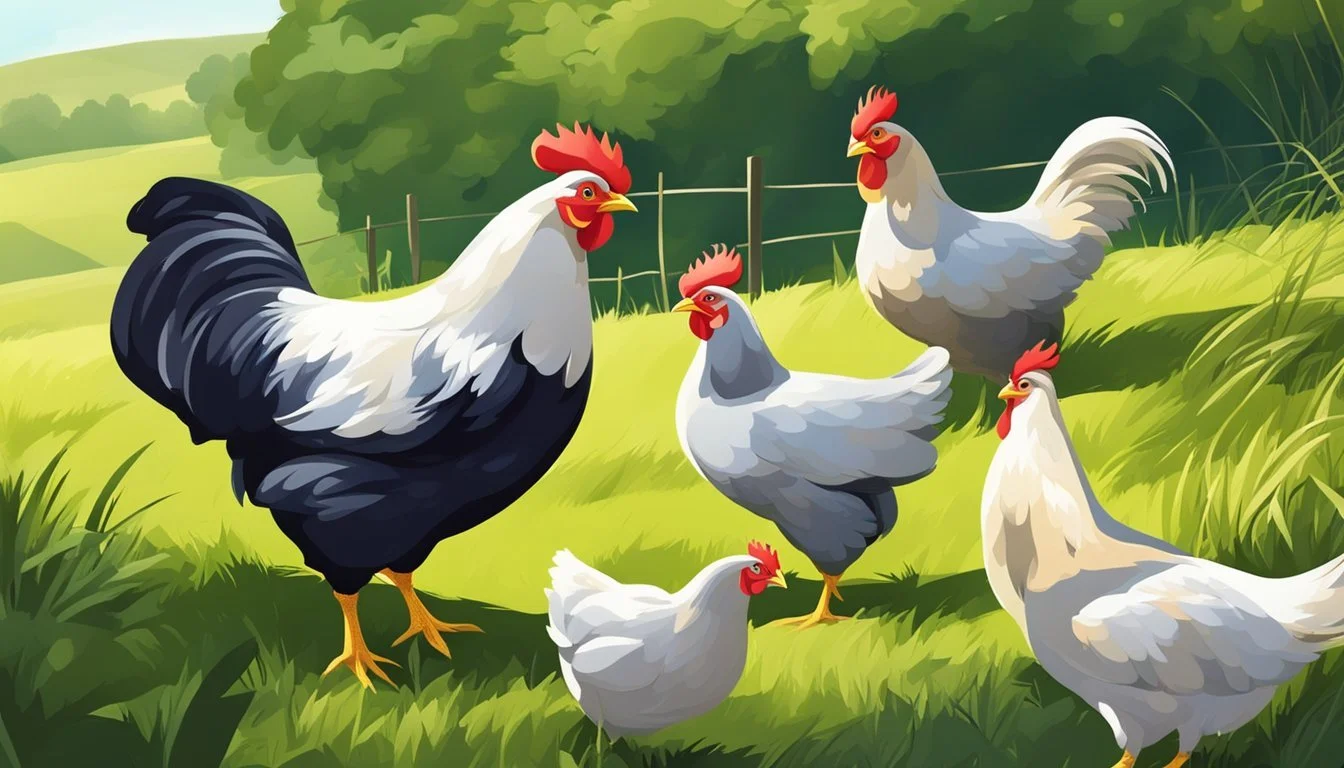Pasture Raised Alfresco Eggs
Benefits and Production Insights
Pasture-raised eggs are a standout offering in the food industry that caters to consumers looking for ethically produced and healthier food options. These eggs come from hens that roam freely in pastures, a stark contrast to the conventional caged or cage-free environments. With pasture-raised methods, each hen is allotted a minimum of 108 square feet of space, allowing them to forage naturally on fresh grasses, succulents, and wildflowers. This approach not only provides a more humane lifestyle for the hens but also contributes to the nutritional quality of the eggs they produce.
Vital Farms is a prominent name when it comes to pasture-fed eggs, known for its commitment to ethical farming practices and sustainable agriculture operating across numerous family farms. The company ensures that its hens enjoy ample roaming room in fresh air and sunshine, which is central to the concept of alfresco eggs. Vital Farms' attention to animal welfare and its impact on product quality reflects an understanding that the conditions under which hens are raised directly influence the eggs that consumers bring to their tables.
These farming practices highlight the sector's shift towards transparency and responsibility, addressing the growing consumer demand for food sources that are not only healthy but also ethically sound. As pasture-raised products like Vital Farms' eggs gain popularity, they pave the way for more sustainable and animal-friendly approaches in the food industry, ensuring that consumer choices can align with their values without compromising on quality.
What Are Pasture-Raised Alfresco Eggs?
In the world of eggs, pasture-raised alfresco eggs distinguish themselves by the quality of life afforded to the hens and the nutritional benefits to consumers. These eggs are sourced from hens with ample outdoor access, foraging freely in natural pastures.
Defining Pasture-Raised
Pastured eggs are laid by hens that have free range in outdoor pastures. Unlike their caged or cage-free counterparts, these hens are allotted significantly more space, typically 108 square feet per bird, to roam, forage, and exhibit natural behaviors. The term "alfresco" underscores the outdoor nature of their habitat, where they enjoy sunlight, fresh air, and a diet that includes local grasses, insects, and wildflowers.
Benefits of Pasture-Raised Eggs
Eggs from pastured hens are often deemed more nutritious. Their foraging behavior leads to a diet that can enhance the eggs' nutritional profile, including higher levels of protein, vitamin D, and iron. Consumers value these eggs for their potential health benefits, which align with broader wellness goals.
Vital Farms Standards
Vital Farms, a prominent name in this market, sets a high standard for pasture-raised eggs. Their hens enjoy at least 108 sq. ft. of roaming room per bird in the pasture. and forage outdoors year-round. This commitment to space and natural foraging opportunities reflects both an ethical approach to animal welfare and a dedication to producing a superior product.
Pasture-Raised Hens' Living Conditions
The living conditions of pasture-raised hens are distinguished by their access to the outdoors, where they can roam freely and benefit from a natural environment. This section explores the specifics of their habitat, health, and the standards that define humane treatment contrary to the conditions of a battery or factory farm with caged poultry.
Open Pastures, Fresh Air, and Sunshine
Pasture-raised chickens enjoy access to open pastures, where they have the freedom to move in fresh air and sunshine.
These hens typically have access to a minimum of 108 square feet per bird, allowing them to exhibit natural behaviors alongside their feathered friends. This outdoor lifestyle ensures ample roaming room and exposure to sunlight, which is vital for their well-being.
Hen Health and Welfare
The health and welfare of hens are paramount in pasture-raised systems. With more space to roam, the birds can engage in natural behaviors, which supports both their physical and mental health.
Year-round access to pastures contributes to a lower-stress environment, promoting a healthy living condition. Their diet is often supplemented by pecking at a diverse range of flora, contributing to more robust health.
Humane Certification Standards
Humane certification standards, such as those from Certified Humane, safeguard the welfare of pasture-raised hens.
To be labeled as humane certified, farms must adhere to strict guidelines, including a maximum density of 1,000 hens per 2.5 acres of pasture.
This ensures that hens are not overcrowded and that the pastures are regularly rotated to maintain ecological sustainability. These certifications act as a promise to consumers about the ethical treatment of the animals producing their eggs.
Farming Practices
The production of pasture-raised alfresco eggs involves various sustainable farming practices. These methods focus on ensuring high animal welfare, supporting family networks of farmers, and promoting environmental health through natural foraging and feeding practices.
Family Farm Networks
Family farms form the bedrock of pasture-raised egg production. By collaborating in networks, these farms benefit from shared knowledge and resources.
Each farm maintains autonomy while operating under unified standards that ensure consistency and quality. These networks often comprise like-minded farmers who are committed to humane and environmentally sensitive practices.
Freedom to Forage: Chickens are given access to fresh pastures, enhancing their quality of life.
Community Impact: Support local economies by empowering family-run farms.
Sustainable Farming Methods
Sustainable farming methods are paramount in the production of alfresco eggs. Farmers employ practices that promote soil health and ecosystem balance.
This includes rotational grazing, where hens are moved across different plots to allow fresh pastures to regenerate, leading to more nutritious and flavorful eggs. Operations aim to leave the land better than it was found, aligning with regenerative agriculture principles.
Soil Preservation: Consists of minimal intervention, letting nature take its course.
Biodiversity Support: Farms often integrate wildflowers and succulents into pastures to support local flora and fauna.
Feeding and Foraging on Pastures
The hens' diet is a pivotal aspect of the farming practice. While the freedom to forage naturally is a cornerstone of the pasture-raised method, supplemented organic feed is also provided to ensure a balanced diet.
The hens live healthy lives where they dine on a diverse array of insects, seeds, wildflowers, and succulents, which contribute to the quality of the eggs.
Natural Diet: Results in nutritionally superior hormone-free eggs with robust flavors.
Organic Certification: Ensures feed is free from pesticides and genetically modified ingredients.
Egg Quality and Nutrition
In the context of egg quality and nutrition, alfresco eggs from pastured hens exhibit distinct characteristics when compared to conventional eggs, particularly in terms of their nutrient content and sensory properties.
Nutritional Comparison
Eggs laid by hens raised on pasture garner attention for their potential nutritional superiority. They typically contain more vitamins and amino acids such as omega-3 fatty acids. A comparative analysis might look like the following:
Taste and Texture Difference
Regarding taste and texture, many consumers report that pastured eggs have a richer flavor and a creamier texture.
These differences are often attributed to the varied diet of hens raised on a pasture, which includes grass, clover, and insects. This diet impacts the egg's quality, with yolks typically appearing more vibrant and the whites holding a firmer consistency.
Packaging and Distribution
In the industry of pasture-raised alfresco eggs, packaging not only serves to protect and transport the eggs but also communicates the brand's commitment to sustainability and ethics.
These eggs are typically found at grocery stores under various dairy brands, each emphasizing their eco-friendly and health-conscious production methods.
Egg Carton Design
Egg cartons for pastured alfresco eggs often reflect the brand’s environmental values. Many use materials such as 100% recycled paper or molded fiber.
The design frequently entails clear labeling that indicates the eggs are from hens with access to grass and outdoor spaces.
Some brands, like Vital Farms, have cartons made with a base of molded fiber and a lid crafted from Solid Bleached Board (SBB), ensuring the packaging is recyclable, compostable, and biodegradable. They align the packaging with eco-conscious values, attracting consumers who prioritize sustainability.
Supply Chain and Grocery Availability
The distribution of alfresco eggs spans a complex supply chain. Eggs are transported from farms where hens roam on pastures to various grocery outlets nationwide. For instance, some egg brands make their eggs available across grocery stores and also feature in select restaurants. They ensure a consistent supply, so consumers have access to ethically produced eggs.
Grocery availability is usually highlighted by the easy recognition of these cartons, placed prominently within the dairy sections of the stores.
Grocery Stores: Found in the dairy section, available in chains nationwide.
Local Availability: Some brands offer local distribution, emphasizing fresh, locally sourced offerings.
Consumer Information
In the realm of egg selection, consumers face a variety of choices, each with its distinct standards and implications. Understanding the particularities of pasture-raised eggs, like those from Vital Farms, can inform buying decisions and ensure product satisfaction.
Purchasing Tips
Where to Buy: Consumers can find pastured eggs at local supermarkets, health food stores, and farmers' markets. Vital Farms eggs are widely distributed and can often be located through the company's website, which offers a store locator feature.
Check for Certifications: Look for seals such as "Certified Humane" or "USDA Certified Organic" to verify that the eggs meet high welfare and organic feed standards.
Examine Freshness: Assess the sell-by date or expiration date on the carton to ensure maximal freshness when purchasing eggs.






